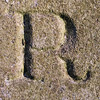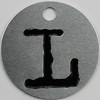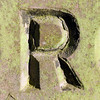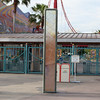Our copy of Wine from These Grapes by Millay was published in 1934. The book is rebound in a forest green cover with the title and author stamped in white on the spine. The call numbers were added by hand. At the very bottom of the spine are the stamped white letters "T.F.M.L.," which I do not remember seeing on more than a handful of our books. Though there are some signs of wear along the edges, it looks pretty good for its age to me. Younger readers used to seeing plastic covered dust jackets may think it just looks ancient.

The title page printed in black and red is really classy. Each word of the title starts with one red letter, and a red emblem containing what appears to be an Olympic torch and Greek script sits in the center of the page. The date is in red Roman numerals at the bottom of the page.
My initial attraction to Edna St. Vincent Millay was her name. It sounded good when I said it aloud. It seemed like a good poet's name, and her reputation is still strong. I have enjoyed several of her collections.
Millay took the title Wine from These Grapes from one of her earlier poems "Buck in the Snow," which suggests we live stained by our experiences until death. There is a focus on death and grieving in the first part of this collection. Millay seems to be finding grief unbearable, for everywhere she looks she finds signs of her missing friend. Walking in the woods where she studies the plants eases the poet's pain, but the disease in her soul is never cured. She leaves us with the thought in "In the Grave No Flower" that the human corpse is not a seed. In this early section I particularly enjoyed "The Fledgling," a sonnet on a bird's first flight, and "Childhood is the Kingdom Where Nobody Dies."
In the middle of the collection are several poems that foresee that World War I was not the war to end wars. "Apostrophe to Man" sees that bacterial warfare and bombing cities from planes will return. "Conscientious Objector" is a manifesto for personal peace, which begins "I shall die, but that is all I shall do for death." Millay does not foresee that she will support Allied forces in the next big war.
The final part of the collection is the 18 stanza "Epitaph for the Race of Man." It is more challenging reading to comprehend seventy years after it was written than the shorter poems in the first two thirds of the book. I did particularly like stanza 11 "Sweeter was loss than silver coins to spend."
At some point in the book (I have lost the spot), Millay states that written word continues to speak through the ages. It certainly does.
Millay, Edna St. Vincent. Wine from These Grapes. New York: Harper & Brothers, 1934.

















